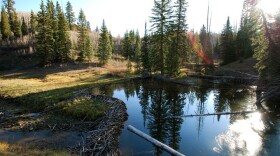A key rationale for conservation is protecting wildlife from the impacts of people. Some of those impacts are obvious, like cutting down trees or building a parking lot over a wetland. Some though are harder to understand or see, literally. A recent study from Boise State University caught my attention. In it researchers created a phantom ‘road’ along a mountainside in Idaho by attaching speakers to trees and playing the sounds of a hi-way into an otherwise pristine forest.
The impacts on migratory birds were dramatic. The amount of birds near to the phantom ‘road’ declined by more than a quarter and some species avoided it almost completely. So what’s that mean for the birds and why can’t they just go somewhere else? In an area with lots of roads or noise things can get pretty problematic; initial results from a follow-up study show that birds eat less when they are near sounds of roads and on a long migration that could mean the difference between making it to their destination or not.
But it’s not just birds that are impacted by noise pollution; other animals are as well. Dozens of species relyon natural quite for everything from communicating with each other to listening for prey or predators. Perhaps the coolest example of this is the intense silence foxes and coyotes need when hunting for mice under the snow.
Even if they aren’t engaged in activities that require silence, animals are negatively affected by all the noise pollution generated by cars, energy extraction and planes. Pronghorn antelope for instance spend much more time looking around for predators than eating when they are close to a road. When they are away from roads, their time switches and they focus on eating.

And this isn’t just a problem for birds and animals. People don’t like noise either, and they demonstrate this with their pocket books. A 2012 study on the Pike National Forest just to our west looked at property values adjacent to public lands. In general, property next to the National Forest is more highly valued than other lands further away. However, where those houses are located within 2 miles of noise–intensive activities like motorized vehicle use and logging operations property values decreased on average by over $17,500. It’s the same reason why Aspen is better than Vail: dead-end road vs. a noisy interstate.
So what’s the solution? Unfortunately, the National Park Service is the only federal agency that is tackling the problem - looking into limiting the use of certain roads during important times of the year or day. Outside of parks, simple things like closing un-needed roads on Forest Service and BLM lands and enforcing existing laws on vehicle noise can go a long way. Likely the best thing we can do is increase the number of National Parks, Roadless Areas, and Wilderness Areas.
O.K., I know all you really wanted was to watch the music video- here’s the link.

Will Roush has worked at the Wilderness Workshop since the summer of 2009 where he began by inventorying lands proposed for wilderness designation. Now that those lands are part of congressional wilderness proposals he works as an organizer and advocate to designate those lands and to protect the Thompson Divide from gas development. Will also organizes the Naturalist Nights winter speaker series, runs Wilderness Workshop's restoration program, and serves on the steering committee of the Roaring Fork Valley Future Forest Roundtable. Will grew up in the Roaring Fork Valley and has a masters in Geography and Environmental Studies examining the impact of climate change on alpine ecosystems. He currentlyserveson the boards of ACES and Ecojustice, Canada's only national environmental law firm. When not at a desk, Will likes to play in the woods, on the rocks and over the snow.




